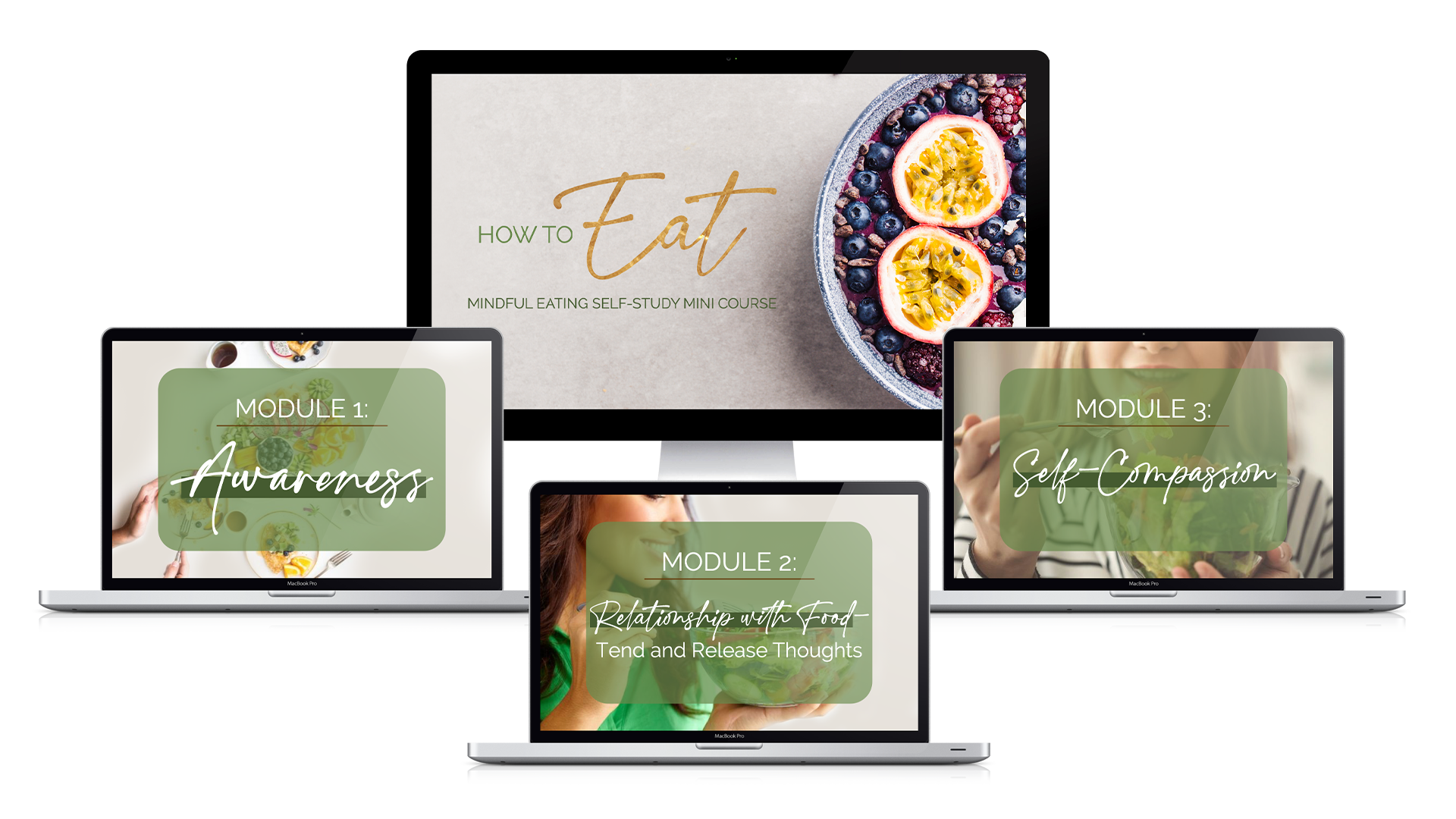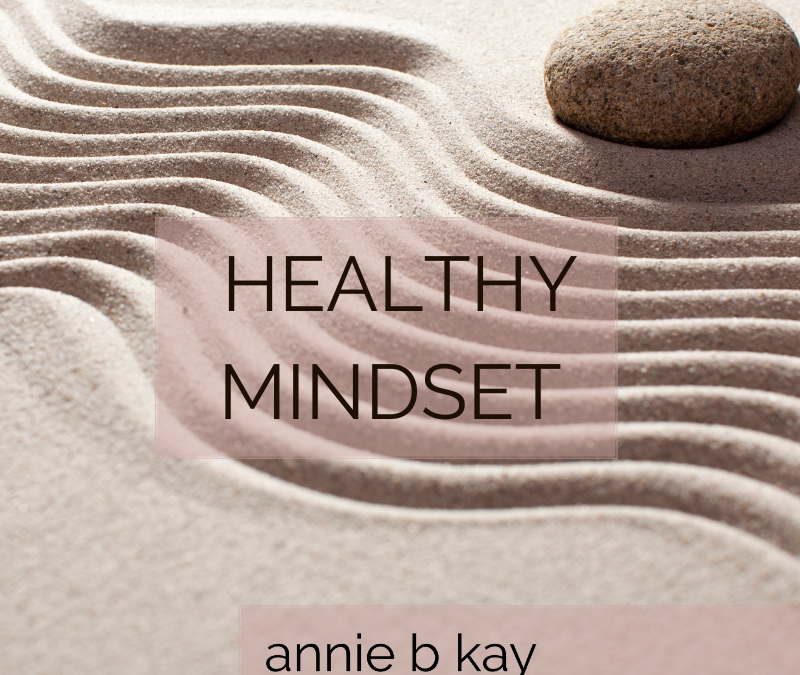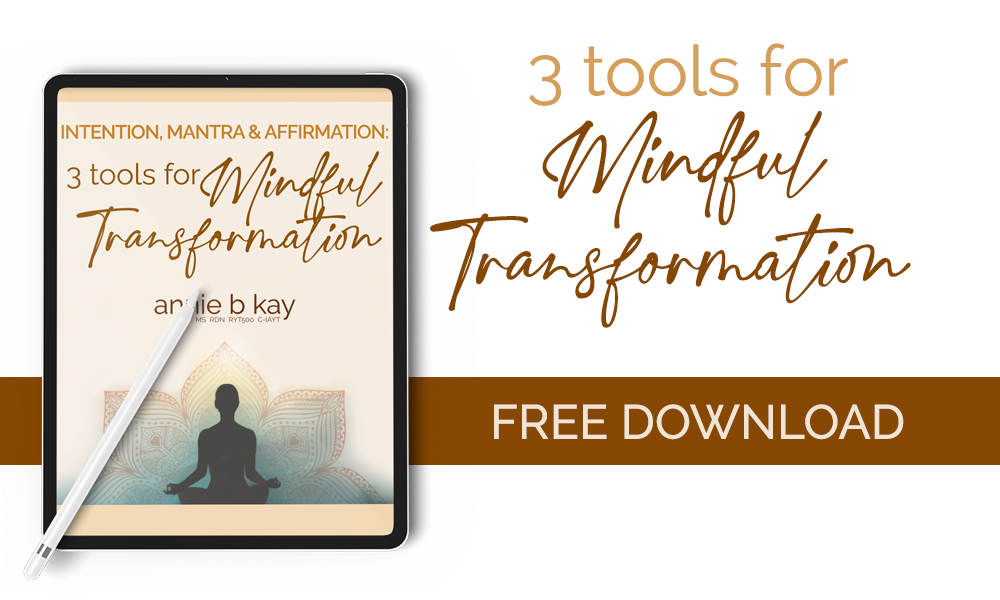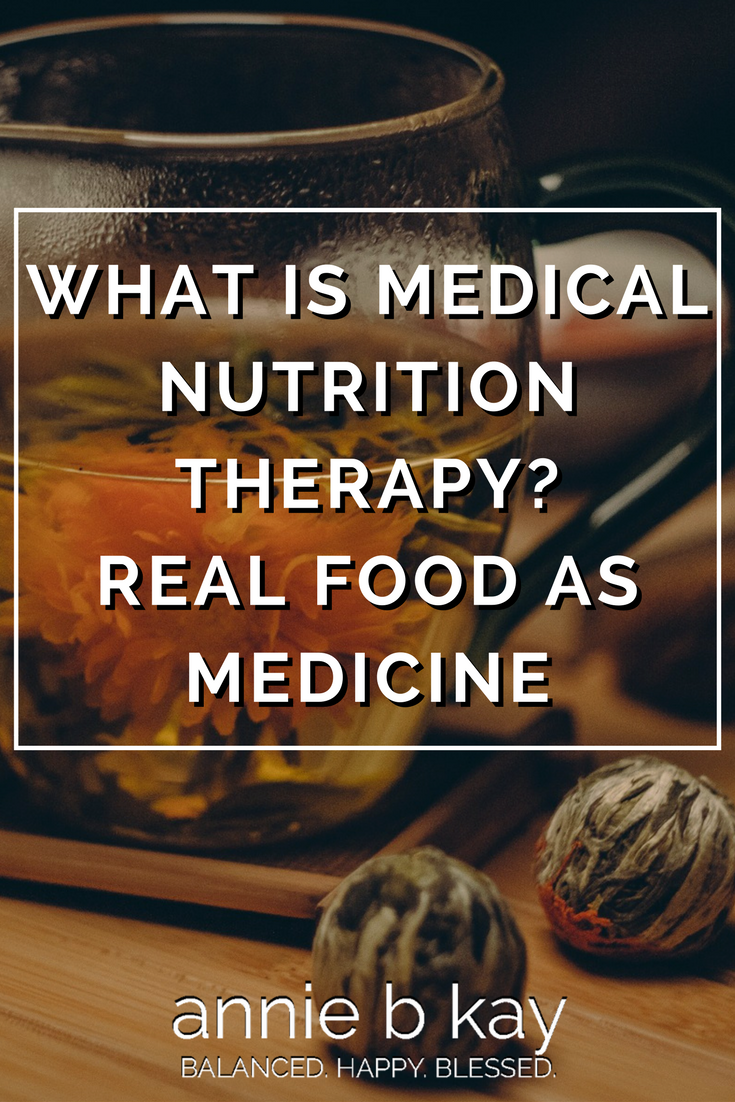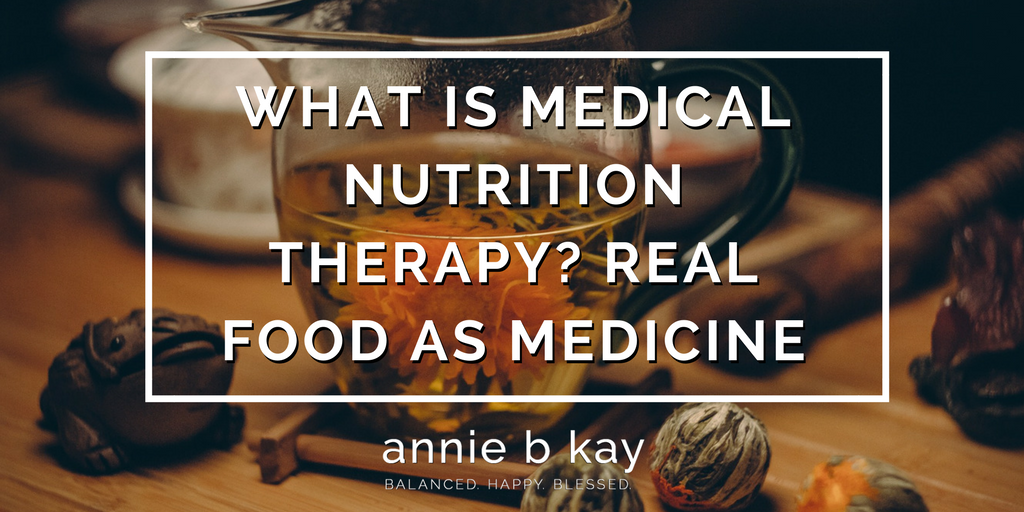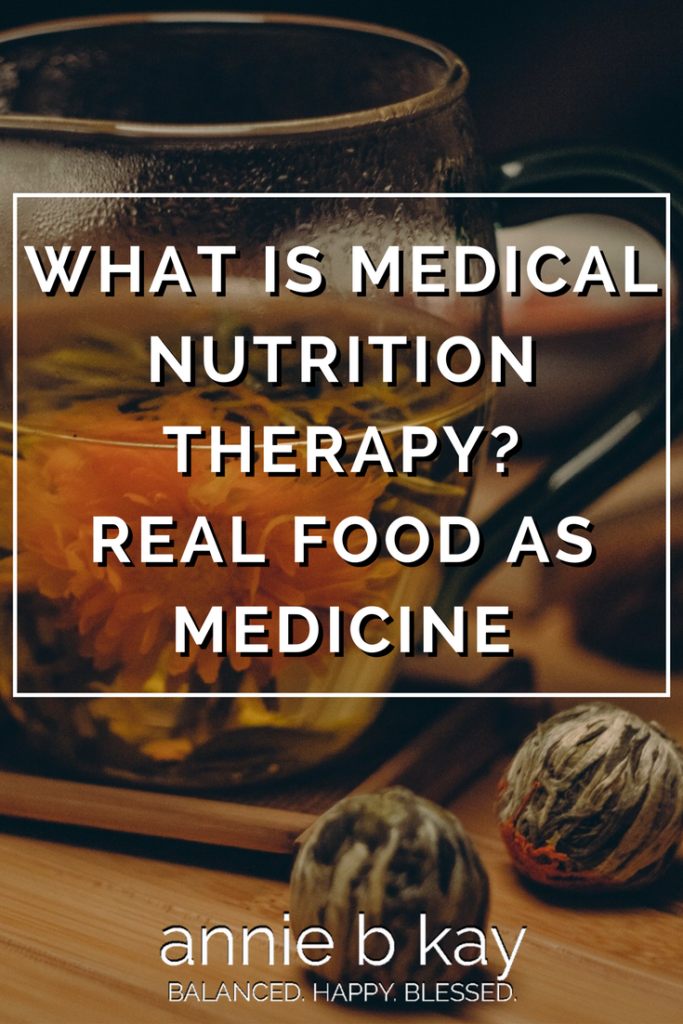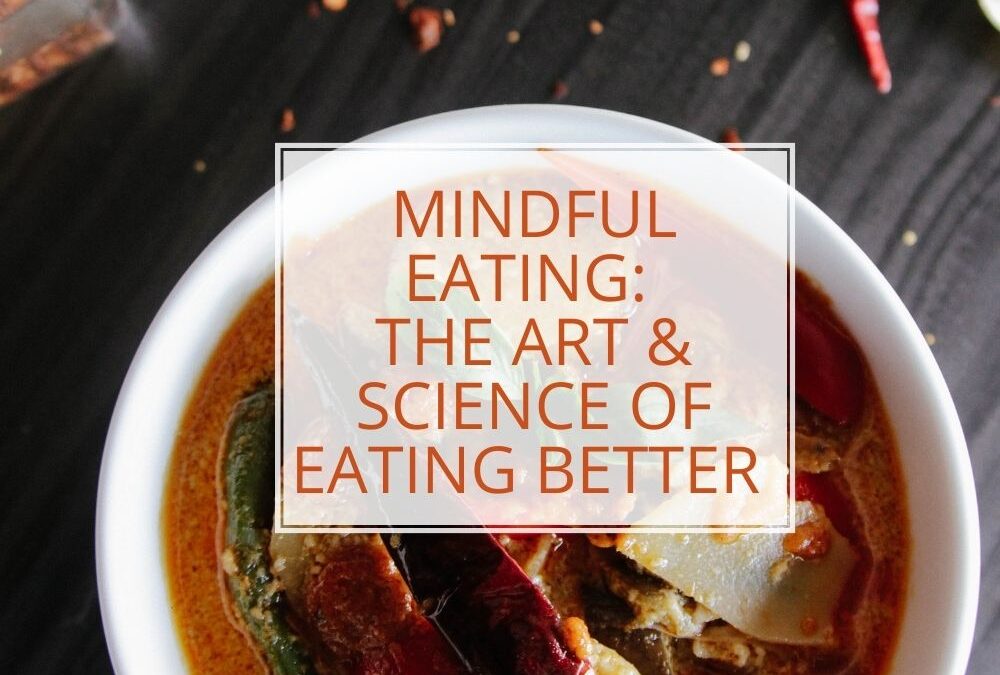
Mindful Eating: The Art & Science of Eating Better
Updated 10/16/2023
Mindful eating is a meditative practice that has the ability to transform your relationship with food and eating. This simple (though not always easy) practice has done nothing less than revolutionize nutrition therapy when combined with evidence-based steps that lean your lifestyle toward health.
So, What is Mindfulness?
Mindfulness is a meditative practice wherein you:
- Adopt a more chill mindset. We humans have the capacity to change our consciousness from our everyday distracted state to a calm, clear relaxed, and more open one. With this friendly mindset, you focus your attention inward and relax. Just experimenting with adopting a curious, expansive mindset before eating will take you far!
- Pay attention to what is happening moment by moment. One definition of mindfulness is meditation while…(whatever you are doing). So, you get curious about whatever you are doing – be it walking or eating – and explore the activity with all your senses. Slowing the activity down so that you can pay attention, and get fascinated enough that you lose yourself – you lose track of time – is mindful meditative absorption.
- There is a particular attitude of mindfulness called non-judgmental awareness. As you practice, you become aware of judgments like comparisons (this food is healthy therefore good, that food is less healthy, therefore not so good, for example). In mindfulness, you aim for a direct, sensory relationship with what you are eating or doing. Use all your senses.
Can you be Mindful without Meditation?
I’ve been a student of consciousness for several decades, and my understanding of mindfulness has evolved through that time. As a classicist, I used to think that mindfulness was a form of meditation, and if you weren’t meditating, it wasn’t mindfulness. Well, my perspective has changed and relaxed with the times!
There is now a collection of practices – kindness, paying attention on purpose (in the words of Jon Kabit-Zinn), and simply slowing down – that yes, can be considered mindfulness activities. Anything that invites the shift to a curious, compassionate mindset – is very helpful, and takes you another step on the mindfulness journey. Many practitioners learned these skills – of changing perspective, of cultivating compassion – through meditative practice.
The answer is yes, you can be mindful without being in meditation. Just practice as you can, and notice what it does to your life. If it helps, keep going.
Now, let’s apply it to eating. Then, check out my mini-course to take you deeper into the transformative practice of mindful eating.
Now, Apply it to Eating
In eating meditation, you slow down, breathe, relax, and enjoy your food. Just how might that unfold?
Here’s a few steps to get you going:
- Make an intention to meditate while eating. Clear distractions (like TV, phones, internet).
- Eat with all five senses. Enjoy the beauty of your plate and each food item on it. Take in the aroma.
- Notice what thoughts and emotions come up for you, as you practice. Breathe, relax, and resist the temptation to ‘push away’ thoughts. Just note – there’s a thought. Feel it, honor it, release it.
- Chew and savor. Can you chew each bite 10 times? 30?
Here is my Kripalu video on Mindful Eating.
Ready to Practice?
Check out How to Eat: My Mindful Eating Mini-course
Getting Started
Do you need to eat like this evermore? Nope. Think of it as a practice – something you do regularly, and build like you might build a muscle. Like learning to breathe the yogic way, Mindful Eating has a tendency to expand on its own. So, you’ll find yourself tuning in naturally to more of what you eat – or finding a moment of awakening – whoa, what I am eating or impressive that I can fit all of that in my mouth!
When I teach mindful eating, at Kripalu or another retreat center, I encourage people to begin where they are. So if you don’t currently do this practice, and you take a few mindful bites each day, terrific.
If you find that you are not practicing, chunk it down until it is ridiculously easy. So, can you take one mindful bite each day? How about one mindful bite on your day off? One mindful breath? If you don’t have the 5-10 seconds it takes to take one mindful breath, well…you are indeed a busy person, and there’s hope for you yet! Maybe a little support, like with my Mini-course. Try try again.
What Does the Science Say?
When I wrote my first book, Every Bite Is Divine, there really wasn’t much research explaining the mechanisms by which mindfulness eating meditation or yoga, does what they do. We just knew it worked. Times have changed!
Now, places like Harvard and Yale are summarizing the science of why mindful eating can be helpful for weight management (1). Cecilia Clementi of The Center for Mindful Eating compiled a comprehensive list of references on mindful eating (2) last year, and the science is evolving fast. A recent study by the psych department at Bowling Green did a nice exploration of several Mindful Eating measurement scales, exploring how a group of people with obesity’s positive and negative emotions relating to food differed (3). This type of study helps people like me provide a better assessment and a better menu of therapeutic options to those I serve.
Impressive!
If You Liked This…Check out:
Healthy Mindset: What, Why and How to Develop Yours
What Has Mindful Eating Done for You?
We all want to know! What keeps you practicing? What’s your biggest challenge? Share your tips and reports!
References
- Harvard Health Publishing – Harvard Medical School, Mindful eating may help with weight loss; July 6, 2011 https://www.health.harvard.edu/healthbeat/mindful-eating-may-help-with-weight-loss
- Clementi, Cecilia – The Center for Mindful Eating; Mindful Eating References, Updated March 2017
- Barnhart WR et al. Mindfulness facets differently relate to self-reported negative and positive emotional eating types in treatment-seeking adults with overweight/obesity. Eat Weight Disord. 2023. doi:10.1007/s40519-023-01578-.9. PMID: 37351755.

